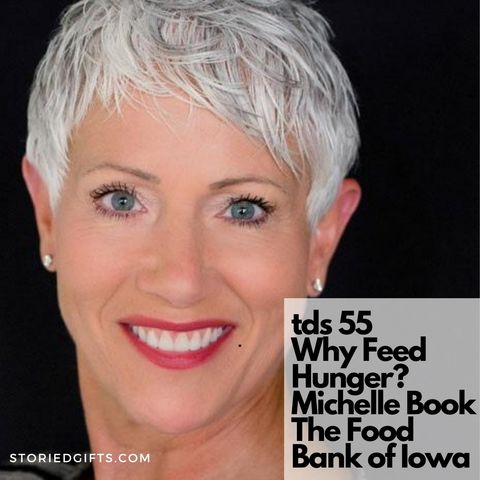TDS 55 Why Feed Hunger? Michelle Book of The Food Bank of Iowa

Descarga y escucha en cualquier lugar
Descarga tus episodios favoritos y disfrútalos, ¡dondequiera que estés! Regístrate o inicia sesión ahora para acceder a la escucha sin conexión.
Descripción
There is almost nothing more essential to our existence than food, and nothing as deeply personal for humans in particular. Think about it: we communicate through food, express culture via...
mostra másThis week on the #thedeliciousstory, we visit with Michelle Book of The Food Bank of Iowa who explains the status of food insecurity in Iowa. In doing so, she also lays out the toll of human suffering due to hunger and explains some surprising ways in which we can benefit with more inclusive access to food.
SHARED SUFFERING IN HUNGER
I was surprised, and perhaps you will be too, by how long The Food Bank of Iowa has been around. Michelle details the history of the organization, their relationship to Feeding America, and their role in assisting food pantries in 55 counties around the state.
Perhaps what is most startling for a local listener is the level of hunger Michelle points to in Iowa BEFORE the latest pandemic crisis. She breaks down the numbers during the interview and also reveals the exponential growth of the issue we are facing right now.
We all deal with fear at some point. It’s unavoidable. Even if you’re not personally facing hunger, you can appreciate on some level what fear of your own survival feels like. For those who are at greatest risk and don’t know where their next meal will come from, the suffering is tenfold.
Maybe you have faced that fear in the past, or have neighbors and friends who are facing it themselves. I once heard someone refer to the monthly bill-paying ritual as “keeping the wolves at bay.” I’ve never lost that imagery over the years, especially in the context of those who have the least.
And oh, how the wolves do howl. From month to month, they circle and encroach. Without resources, some are faced with an insurmountable hurdle—one they face day-to-day. What has to get paid first? Most likely, rent. Then, the car if there’s a job that requires it. By the time they cross off essentials, there may be little, or nothing, left for food. These are the people who come to the food pantries. And these days, the people in the lines at the pantry include so many who never imagined they would face this need.
As Michelle explains, food insecurity is nothing new for Iowans. Michelle details where we were in terms of hunger post the 2008 recession. The recovery has not been equal or fully realized by many who often work fulltime earning and unlivable wage. As of data reported in 2019, 1 in 10 adults and 1 in 7 children are struggling with hunger. The pandemic has exponentially impacted Iowans increasing the roster of those who are suffering.
It’s understandable to feel paralyzed by the numbers and to wonder if hunger is an issue that that can quickly and practically be addressed. One piece of the answer that many people don’t realize is that we all benefit when everyone has access to good nutrition.
Per the Center for American Progress 2010 data, each of us pays more than $500 per year for hunger-related problems in the U.S. due to lost economic productivity and increased health care costs. Simply by assuring adequate nutrition, we address future problems before they arise.
KICK FEAR AND DO SOMETHIHNG
I asked Michelle about the issue of food waste as one way to help solve food insecurity. Pre-pandemic, the issue was daunting. Per the UDSA, in the United States food waste was estimated at 30-40 percent of the food supply, meaning approximately 133 billion pounds (and $161 billion worth of money that would have gone into the economy) lost in 2010. Certainly, food waste is an important issue, but you’ll be stunned by the situation as it has unfolded recently, and how these new developments are impacting the donation chain for The Food Bank of Iowa.
Circling back to the issue of the fear—which we may all be harboring these days—the alternative is the opportunity to take action and help reduce human suffering for our fellow Iowans. Michelle offers ways you can help The Food Bank of Iowa. It feels wonderful to work with an organization which has decades of a proven record for bringing food to those who need it most. No food or action goes wasted.
Usually, on The Delicious Story I ask the guest to share a memorable meal. I’m sure you will feel the goosebumps on your neck as Michelle shares her experience. It’s the kind of gut-wrenching account that puts a face on mere data.
By assuring we each have a place at the table, we make the world better. By giving fear the boot in exchange for action the return is something more precious and dearly needed, a sense of hope.
Postscript: I made a commitment at the beginning of this year to donate the cost of one meal per week to The Food Bank of Iowa. I have been practicing fasting to lose weight and have also been exploring the benefits of eating less. It’s a small action which has left me humbled. Each time I opt out of heading to the fridge, I’m reminded of how fortunate I am to have the choice to eat or not. I think of those who don’t have the luxury of a choice. If you’d like to support The Food Bank of Iowa here is where to begin.
Información
| Autor | Sherry A Borzo |
| Organización | Sherry A Borzo |
| Página web | - |
| Etiquetas |
Copyright 2024 - Spreaker Inc. an iHeartMedia Company
